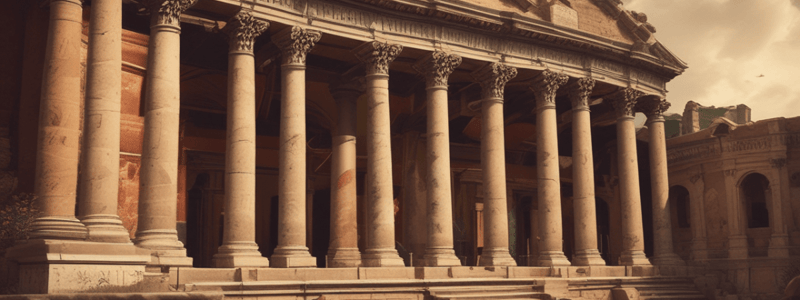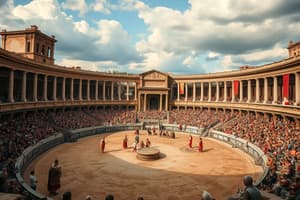Podcast
Questions and Answers
What was the official language of the ancient Romans?
What was the official language of the ancient Romans?
- Phoenician
- Greek
- Latin (correct)
- Italian
Why did the Roman Empire prefer to let conquered people adopt Latin on their own will?
Why did the Roman Empire prefer to let conquered people adopt Latin on their own will?
- To isolate them from the rest of the empire
- To impose Roman culture on them
- To facilitate business and communication across the empire (correct)
- To legally require it and punish those who didn't comply
What was the approximate literacy rate of the Roman Empire during its time period?
What was the approximate literacy rate of the Roman Empire during its time period?
- Up to 20% of the population
- Up to 30% of the population (correct)
- Up to 50% of the population
- Up to 10% of the population
Who devised the modern alphabet that influenced the Latin alphabet?
Who devised the modern alphabet that influenced the Latin alphabet?
What was one of the ways Latin became associated with importance?
What was one of the ways Latin became associated with importance?
What is a common practice today that is influenced by the Romans' use of Latin?
What is a common practice today that is influenced by the Romans' use of Latin?
Who were some of the greatest Roman authors?
Who were some of the greatest Roman authors?
What was a common characteristic of Roman literature?
What was a common characteristic of Roman literature?
What was a significant contribution of Cicero's writings to Western civilization?
What was a significant contribution of Cicero's writings to Western civilization?
What type of government did the Roman republic have?
What type of government did the Roman republic have?
What was a key concern of the Roman legal system?
What was a key concern of the Roman legal system?
What was a significant legacy of Roman law in modern democracies?
What was a significant legacy of Roman law in modern democracies?
What was the significance of Roman citizenship?
What was the significance of Roman citizenship?
What was a lasting legacy of Virgil and Ovid's works?
What was a lasting legacy of Virgil and Ovid's works?
What was a key aspect of the Roman system of government after 29 BC?
What was a key aspect of the Roman system of government after 29 BC?
Flashcards are hidden until you start studying
Study Notes
Ancient Roman Civilization
- The ancient Romans were an Italian civilization that thrived from roughly 509 BC to 476 AD.
- The Roman Empire stretched across most of Europe and the Mediterranean region, from Britain to Africa.
Legacies of Roman Language
- The official language of the Romans was Latin.
- Latin unified the first inhabitants of Rome, and its importance led to strict rules about grammar and spelling.
- Latin became a shared language across the Roman Empire, allowing conquered people to conduct business together.
- The Roman Empire had a relatively high literacy rate of up to 30% of the population.
- The Latin alphabet was influenced by ancient Italian languages, the Greeks, and the Phoenicians.
- Latin was used as the official language for kingdoms, churches, and scholars throughout history.
Legacies of Roman Literature
- Roman poets and authors, such as Cicero, Horace, Virgil, and Ovid, composed important works of literature.
- Their works were written in poetic styles that blended reality and mythology, reflecting Roman religious beliefs.
- Cicero's writings about morality and philosophy helped define modern standards of right and wrong.
- Horace set standards of style for poetry.
- Virgil and Ovid provided important historical accounts of Rome and established classical mythology.
Legacies of Roman Law
- The Romans developed a complex legal system that defended democracy.
- The Roman laws included practices to limit the power of rulers and protect the rights of the people.
- Examples of Roman laws with lasting legacies include term limits, separation of powers, system of checks and balances, impeachment, and elections.
- Roman citizenship defined who could receive the rights of Roman law, and it was institutionalized to protect citizens' rights.
- The concept of citizenship has remained critical in modern nations, where citizenship is required to vote.
Studying That Suits You
Use AI to generate personalized quizzes and flashcards to suit your learning preferences.





